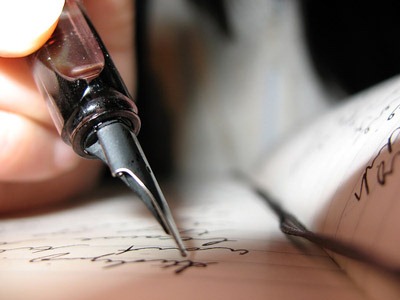
Image Credit: http://www.professorbeej.com/2010/07/writing-my-novel-keep-on-writing.html
So you’ve amassed enough raw ideas and information to start actually writing your novel (or maybe not. You might work better just free-writing and then fact-check-editing all at once. I don’t know your life). The task of sitting down to commit your ideas to paper can be a tough one, I know. It’s like writing a final term paper; you chose your final topic based on your greatest interest (maybe strategically planning to hold off on this topic until the final paper) and it’s actually a fun time doing the prep work—but you still have to write the paper.
At this stage, you should experiment with your writing environment and figure out what works best for what mood. A café might be great for regrouping your thoughts. A silent library might be best for sitting down and grinding out a chapter or two in a few hours. Or perhaps you’ll find that like Virginia Woolf, you work best in your own room. Make a working playlist. Try writing out your initial draft by hand. Maybe borrow a typewriter. Your novel doesn’t have a concrete deadline. Spend a few days just optimizing your productivity.
Places for Writers in New York
Café’s: ‘Snice (45 8th Street), Hungarian Pastry Shop (1030 Amsterdam Avenue), B Cup Café (212 Avenue B), The Tea Lounge (837 Union Street, Brooklyn), Outpost Lounge (where I write, 1014 Fulton Street, Brooklyn)
Workspaces: The Writer’s Studio at the Mercantile Library Center for Fiction (17 E 47th Street, by application and with membership fee), Paragraph (35 W 14th Street, by application and with membership fee), Brooklyn Creative Lounge (540 President Street, Brooklyn, by application ad with membership fee), New York Public Libraries…your…campus libraries?
If you are not terribly distractible when working with other people, it could help to join a writers’ salon so that you can discuss your writing or perhaps motivate yourself to write with other people.
Sidebar: Writing habits or haunts of various authors
Joyce Carol Oates writes in longhand for six to eight hours every day.
Truman Capote wrote while lying down, drinking and smoking cigarettes.
Vladimir Nabokov wrote his novels all on index cards.
Tom Wolfe writes ten pages every day, regardless of how long it takes for him to finish.
Edgar Allan Poe as well as Jonathan Franzen spent some time at The Writer’s Studio at the Mercantile Library Center for Fiction
Joan Didion consistently rewrites her novels from the beginning (or almost beginning) every day.
Bob Dylan and Jack Kerouac both wrote in the Village bar, Kettle of Fish
By Robin Yang
Robin Yang was one of the Campus Clipper’s publishing interns, who wrote an e-book on how to write a novel. If you like Robin’s writing, follow our blog for more chapters from this e-book. We have the most talented interns ever and we’re so proud of them! For over 20 years, the Campus Clipper has been offering awesome student discounts in NYC, from the East Side to Greenwich Village. Along with inspiration, the company offers students a special coupon booklet and the Official Student Guide, which encourage them to discover new places in the city and save money on food, clothing and services.
At the Campus Clipper, not only do we help our interns learn new skills, make money, and create wonderful e-books, we give them a platform to teach others. Check our website for more student savings and watch our YouTube video showing off some of New York City’s finest students during last year’s Welcome Week.
Become a fan on Facebook and follow us on Twitter and Instagram!

